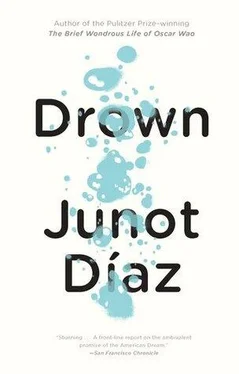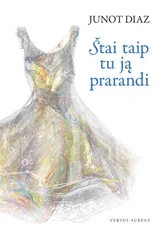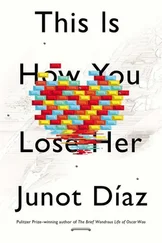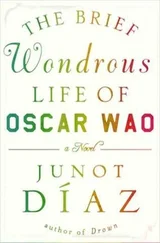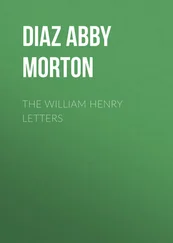On Saturday a late hurricane passed close to the Capital and the next day folks were talking about how high the waves were down by the Malecón. Some children had been lost, swept out to sea and Abuelo shook his head when he heard the news. You’d think the sea would be sick of us by now, he said.
That Sunday Mami gathered us on the back patio. We’re taking a day off, she announced. A day for us as a family.
We don’t need a day off, I said and Rafa hit me harder than normal.
Shut up, OK?
I tried to hit him back but Abuelo grabbed us both by the arm. Don’t make me have to crack your heads open, he said.
She dressed and put her hair up and even paid for a concho instead of crowding us into an autobus. The driver actually wiped the seats down with a towel while we waited and I said to him, It don’t look dirty, and he said, Believe me, muchacho, it is. Mami looked beautiful and many of the men she passed wanted to know where she was heading. We couldn’t afford it but she paid for a movie anyway. The Five Deadly Venoms. Kung fu movies were the only ones the theaters played in those days. I sat between Mami and Abuelo. Rafa moved to the back, joining a group of boys who were smoking, and arguing with them about some baseball player on Licey.
After the show Mami bought us flavored ices and while we ate them we watched the salamanders crawling around on the searocks. The waves were tremendous and some parts of George Washington were flooded and cars were churning through the water slowly.
A man in a red guayabera stopped by us. He lit a cigarette and turned to my mother, his collar turned up by the wind. So where are you from?
Santiago, she answered.
Rafa snorted.
You must be visiting relatives then.
Yes, she said. My husband’s family.
He nodded. He was dark-skinned, with light-colored spots about his neck and hands. His fingers trembled slightly as he worked the cigarette to his lips. I hoped he’d drop his cigarette, just so I could see what the ocean would do to it. We had to wait almost a full minute before he said buenos días and walked away.
What a crazy, Abuelo said.
Rafa lifted up his fist. You should have given me the signal. I would have kung-fu-punched him in the head.
Your father came at me better than that, Mami said.
Abuelo stared down at the back of his hands, at the long white hairs that covered them. He looked embarrassed.
Your father asked me if I wanted a cigarette and then he gave me the whole pack to show me that he was a big man.
I held on to the rail. Here?
Oh no, she said. She turned around and looked out over the traffic. That part of the city isn’t here anymore.
6.
Rafa used to think that he’d come in the night, like Jesus, that one morning we’d find him at our breakfast table, unshaven and smiling. Too real to be believed. He’ll be taller, Rafa predicted. Northamerican food makes people that way. He’d surprise Mami on her way back from work, pick her up in a German car. Say nothing to the man walking her home. She would not know what to say and neither would he. They’d drive down to the Malecón and he’d take her to see a movie, because that’s how they met and that’s how he’d want to start it again.
I would see him coming from my trees. A man with swinging hands and eyes like mine. He’d have gold on his fingers, cologne on his neck, a silk shirt, good leather shoes. The whole barrio would come out to greet him. He’d kiss Mami and Rafa and shake Abuelo’s reluctant hand and then he’d see me behind everyone else. What’s wrong with that one? he’d ask and Mami would say, He doesn’t know you. Squatting down so that his pale yellow dress socks showed, he’d trace the scars on my arms and on my head. Yunior, he’d finally say, his stubbled face in front of mine, his thumb tracing a circle on my cheek.
My mother tells meBeto’s home, waits for me to say something, but I keep watching the TV. Only when she’s in bed do I put on my jacket and swing through the neighborhood to see. He’s a pato now but two years ago we were friends and he would walk into the apartment without knocking, his heavy voice rousing my mother from the Spanish of her room and drawing me up from the basement, a voice that crackled and made you think of uncles or grandfathers.
We were raging then, crazy the way we stole, broke windows, the way we pissed on people’s steps and then challenged them to come out and stop us. Beto was leaving for college at the end of the summer and was delirious from the thought of it — he hated everything about the neighborhood, the break-apart buildings, the little strips of grass, the piles of garbage around the cans, and the dump, especially the dump.
I don’t know how you can do it, he said to me. I would just find me a job anywhere and go.
Yeah, I said. I wasn’t like him. I had another year to go in high school, no promises elsewhere.
Days we spent in the mall or out in the parking lot playing stickball, but nights were what we waited for. The heat in the apartments was like something heavy that had come inside to die. Families arranged on their porches, the glow from their TVs washing blue against the brick. From my family apartment you could smell the pear trees that had been planted years ago, four to a court, probably to save us all from asphyxiation. Nothing moved fast, even the daylight was slow to fade, but as soon as night settled Beto and I headed down to the community center and sprang the fence into the pool. We were never alone, every kid with legs was there. We lunged from the boards and swam out of the deep end, wrestling and farting around. At around midnight abuelas, with their night hair swirled around spiky rollers, shouted at us from their apartment windows. ¡Sinvergüenzas! Go home!
I pass his apartment but the windows are dark; I put my ear to the busted-up door and hear only the familiar hum of the air conditioner. I haven’t decided yet if I’ll talk to him. I can go back to my dinner and two years will become three.
Even from four blocks off I can hear the racket from the pool — radios too — and wonder if we were ever that loud. Little has changed, not the stink of chlorine, not the bottles exploding against the lifeguard station. I hook my fingers through the plastic-coated hurricane fence. Something tells me that he will be here; I hop the fence, feeling stupid when I sprawl on the dandelions and the grass.
Nice one, somebody calls out.
Fuck me, I say. I’m not the oldest motherfucker in the place, but it’s close. I take off my shirt and my shoes and then knife in. Many of the kids here are younger brothers of the people I used to go to school with. Two of them swim past, black and Latino, and they pause when they see me, recognizing the guy who sells them their shitty dope. The crackheads have their own man, Lucero, and some other guy who drives in from Paterson, the only full-time commuter in the area.
The water feels good. Starting at the deep end I glide over the slick-tiled bottom without kicking up a spume or making a splash. Sometimes another swimmer churns past me, more a disturbance of water than a body. I can still go far without coming up. While everything above is loud and bright, everything below is whispers. And always the risk of coming up to find the cops stabbing their searchlights out across the water. And then everyone running, wet feet slapping against the concrete, yelling, Fuck you, officers, you puto sucios, fuck you.
When I’m tired I wade through to the shallow end, past some kid who’s kissing his girlfriend, watching me as though I’m going to try to cut in, and I sit near the sign that runs the pool during the day. No Horseplay, No Running, No Defecating, No Urinating, No Expectorating. At the bottom someone has scrawled in No Whites, No Fat Chiks and someone else has provided the missing c. I laugh. Beto hadn’t known what expectorating meant though he was the one leaving for college. I told him, spitting a greener by the side of the pool.
Читать дальше
